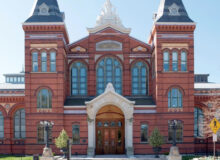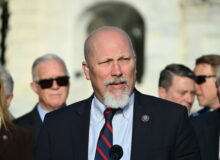The Geneva Bible was the first Bible to be completely translated to English from the original language. It was the first Bible that qualified as a study Bible with comments about the original manuscripts, clarification of some of the ambiguous meanings, cross references, annotations all for the most common of reader at that time to understand. It was the first Bible to break down the books into chapters and break the chapters into verses to help facilitate memorization. Because it was printed in a small readable print, Roman type as opposed to the Old Gothic, all Pilgrims had a copy making it the center of their daily living.
These are the circumstances that prevailed virtually throughout Europe and Great Britain and this necessitated Christians seeking freedom of worship to leave Europe and Great Britain and face the dangers of traveling for over two months on the high seas to seek out a place where they could worship as they believed God wanted them to without the persecution from the government.
Most people that came to this country in the 1600’s, starting in 1606, came because of this type of religious persecution and their desire for religious freedom. The people’s Bible was the Geneva Bible which was outlawed in most of Europe because it taught things that contradicted the Church of England and the Catholic Church. It also taught things that went against the long standing structure of society. The Geneva Bible was the first Bible to be read by the common person. This is a time period where it was actually illegal to own an English Bible. The Catholic Church taught that the common person was not able to understand the Bible and only a priest could correctly discern the divine writ and a Bible in the English language was illegal because it was in a ‘vulgar tongue’. The Geneva Bible taught self government, free enterprise, education of the whole population not just the ‘blue bloods’, civil virtue, (a society of moral goodness; the practice of moral duties and the abstaining from vice, or a conformity of life and conversation to the moral law. In this sense, virtue may be, and in many instances must be, distinguished from religion. The practice of moral duties merely from motives of convenience, or from compulsion, or from regard to reputation, is virtue, as distinct from religion. The practice of moral duties from sincere love to God and His laws, is virtue and religion.)9, protection of women and children and cultivating a godly culture. It is from this background that the people came to America.
Many have stated that it was for economic gain that America began to be populated and there is a portion of truth about that because of the vast untapped resources that were available in America, but when you study the charters for each settlement and the Constitutions of the colonies, there is one glaring truth that the revisionist historians refuse to acknowledge and that is their number one purpose for coming to America was to ‘propagate the Christian religion’. They wanted the freedom to worship how they believed they were supposed to and to spread the gospel to the inhabitants of the new land. This is proven by the Mayflower Compact which was written before they disembarked from the ship.
The Mayflower Compact
“In the name of God, Amen. We, whose names are underwritten, the Loyal Subjects of our dread Sovereign Lord, King James, by the Grace of God, of England, France and Ireland, King, Defender of the Faith, e&.
Having undertaken for the Glory of God, and Advancement of the Christian Faith, and the Honour of our King and Country, a voyage to plant the first colony in the northern parts of Virginia; do by these presents, solemnly and mutually in the Presence of God and one of another, covenant and combine ourselves together into a civil Body Politick, for our better Ordering and Preservation, and Furtherance of the Ends aforesaid; And by Virtue hereof to enact, constitute, and frame, such just and equal Laws, Ordinances, Acts, Constitutions and Offices, from time to time, as shall be thought most meet and convenient for the General good of the Colony; unto which we promise all due submission and obedience.
In Witness whereof we have hereunto subscribed our names at Cape Cod the eleventh of November, in the Reign of our Sovereign Lord, King James of England, France and Ireland, the eighteenth, and of Scotland the fifty-fourth. Anno Domini, 1620.” (Emphasis added) There is no question as to the main purpose for the settlement and that is the advancement of the Christian faith. Yes, there were other motives but THE motive was the advancement of the Christian faith. We will see throughout this study that everything in the lives of the pilgrims and our Founders up to the middle of the 20th Century was centered on and grounded in the Christian faith of the people and their desire to live by those principles. Was this the lifestyle of 100% of the people? No. But it was the lifestyle of the majority of the people. What has been lost is the understanding of those Christian principles and how they were intertwined in their personal lives, their public lives, and their political lives along with bringing those principles into the government itself. We have all heard about the separation of church and state. There are NO provisions in our Constitution for this. There is no direct article that forbids Christian principles in our government. If that were the case our Constitution would be illegal. NONE of the Founders practiced separation of church and state. The separation was between the government’s involvement in the church dictating what to teach, how a person was to worship, when and where a person could worship, and taxing the people to support the church. The government could not regulate the church, its doctrines or its practices. Today prayer is forbidden in most public settings, city council meetings, schools and any other setting outside the church, yet in the days of our Founders, EVERY meeting was opened with prayer. The first session of Congress was a 4 hour prayer meeting. We will get into a deeper discussion of this in later chapters but the basic ‘separation’ the Founders wanted was an institutional separation not an influential separation; keeping government out of religion but allowing the positive influence of Christian principles to have a free hand within the government.
The American experiment is rooted entirely in the Christian faith of the pilgrims and the Founders. Our Constitution was written after many years of successfully living by Biblical principles and is based on those principles. Our Founders incorporated Christian principles into our laws and our Constitution. James Wilson, a signer of the Declaration of Independence and a signer of the Constitution (there were only 6 who signed both), was the second most active member at the Constitutional Convention speaking 168 times. After the signing of the Constitution, President Washington placed him as an original justice of the Supreme Court. This was a wise decision to have someone that helped draft the Constitution be a member of the Court that interprets the Constitutional intent. He was the first one that came up with the idea of formal legal training in America. Up to this time you simply worked with an attorney as an apprentice and after a few years, you took the bar exam. Wilson wrote the first legal texts that were used in the first legal schools in America. In his writings he taught that you not only had to understand civil law, you had to understand the basis of civil law. He states that civil law MUST rest on that law which is divine. Wilson concluded that: “All [laws], however, may be arranged in two different classes. 1) Divine. 2) Human. . . But it should always be remembered that this law, natural or revealed, made for men or for nations, flows from the same Divine source: it is the law of God. . . Human law must rest its authority ultimately upon the authority of the law that which is Divine.” 10(Emphasis added) James McHenry, Revolutionary Officer; Signer of the Constitution; Ratifier of the Constitution; Secretary of War under George Washington and John Adams claimed: “The Holy Scriptures can alone secure to society order and peace. And to our courts of justice and constitutions of governments purity, stability and usefulness. In vain, without the Bible, we increase our penal laws and draw protections around our institutions.” 11 Noah Webster, Revolutionary soldier; Judge; Legislator; Educator; “School Master to America declared: “The Christian religion… is the basis, or rather the source, of all genuine freedom in government… I am persuaded that no civil government of a republican form can exist and be durable in which the principles of Christianity have not a controlling influence.” 12 He also stated: “The religion which has introduced civil liberty is the religion of Christ and His apostles… This is genuine Christianity and to this we owe our free constitutions of government.”13 Joseph Story, U.S. Congressman; Father of American Jurisprudence; U.S. Supreme Court Justice; boldly declared: “One of the beautiful boasts of our municipal jurisprudence is that Christianity is a part of the Common Law. There never has been a period in which the Common Law did not recognize Christianity as lying at its foundations.” 14 I could go on and on quoting one Founder after another concerning the fact that the government of the United States was founded exclusively on Christian principles. As we continue we will see just how deeply these men and women practiced their faith and just how much they depended on these Christian principles in forming a free government.
End Notes
9) Webster, N. (2006). Noah Webster’s first edition of An American dictionary of the English language. Reprint of the 1828 ed. published under title: An American dictionary of the English language. Anaheim, CA: Foundation for American Christian Education.,
10) James Wilson, The Works of the Honorable James Wilson, Bird Wilson, editor (PhiladelphiaL Lorenzo Press, 1804), Vol. I, pp. 103-105, “Of the General Principles of Law and Obligation.”
11) Bernard C. Steiner, One Hundred and Ten Years of Bible Society Work in Maryland, 1810-1820 (Baltimore: The Maryland Bible Society, 1921), p. 14.
12) K. Alan Snyder, Defining Noah Webster: Mind and Morals in the Early Republic (New York: University Press of America, 1990), p. 253, to James Madison on October 16, 1829.
13) Noah Webster, History of the United States (New Haven: Durrie and Peck, 1832), p. 300, ¶ 578.
14) Joseph Story, Life and Letters of Joseph Story, William W. Story, editor (Boston: Charles C. Little and James Brown, 1851), Vol. II, p. 8.
Tags: American History Founding fathers Religious Freedom





















Join the conversation!
We have no tolerance for comments containing violence, racism, vulgarity, profanity, all caps, or discourteous behavior. Thank you for partnering with us to maintain a courteous and useful public environment where we can engage in reasonable discourse.